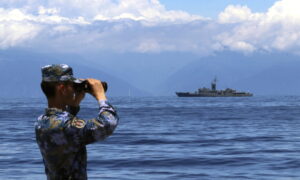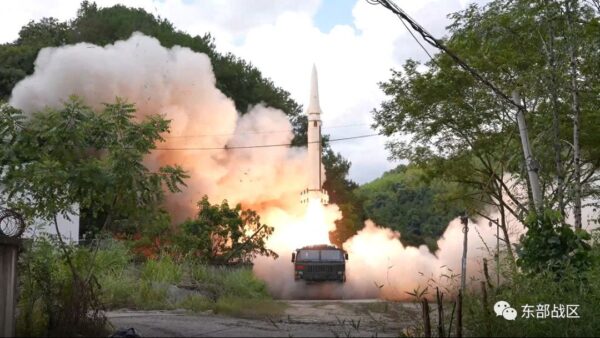China and Taiwan: The Chinese Python
CommentaryA U.S. government friend involved in Indo-Pacific defense matters asked me the question a lot of people are wondering about. Following U.S. House Speaker Nancy Pelosi’s visit to Taipei on Aug. 2-3, China launched a series of aggressive moves targeting Taiwan, most visibly unprecedented military exercises. So he asked: “Running up to the 20th Party Congress to be held towards the end of the year, do you think the PRC [People’s Republic of China] will ramp up? Keep the ‘new normal’? Or decrease its pressure on Taiwan?” Here’s what I told him: China is on a timeline for seizing Taiwan. It will move faster or slower as opportunity allows. When does the timeline “end”? By 2030 or sooner—and maybe much sooner. Beijing prefers to get Taiwan without fighting—and ideally without tangling with the Americans. But it’s willing to do both—to include “going kinetic” and taking on the Americans (and the Japanese)—and sees itself as able to do so and succeed. The upcoming 20th Party Congress somewhat shapes the Chinese regime’s behavior toward Taiwan, but I think it’s a less important variable. Xi Jinping has plenty of enemies, but his control seems solid enough as things stand now. However, he doesn’t want to appear to have been “bested” by the Americans (or anyone else) or to have gotten China into a catastrophe of some sort. Neither has happened. I would suggest that Chinese decision-making is more affected by the state of affairs on the U.S. side. Specifically, the more the United States (and the Biden administration) looks weak, distracted, and confused, the more pressure the Chinese communists will apply on Taiwan—including tightening the “military” noose. And there is also the all-important question of “will”—that is, Beijing’s perception of whether the Biden administration has the nerve/spine/fortitude/sang-froid to respond effectively as China makes its incremental moves against Taiwan. And the moves at some point will not be incremental as China aims to finish things off. At least from my perspective, the Biden administration’s responses to the most recent exercises and rehearsal for blockading and assaulting Taiwan were weak. Yes, some nice language, but nothing that would make Beijing think it had gone too far—and was going to face some serious punishment. The Rocket Force under the Eastern Theater Command of China’s People’s Liberation Army fires live missiles into the waters near Taiwan, from an undisclosed location in China on Aug. 4, 2022. (Eastern Theatre Command/Handout via Reuters) The Biden administration’s response has been largely “reactive”—doing very little in hopes China will back off. And many parts of the U.S. elite, commentariat, business, and official classes called for the United States not to escalate matters. Washington even “postponed” a scheduled missile test in the Pacific and billed it as a “responsible” step to not escalate matters further. Beijing saw it as a weakness. One notes that many officials handling Indo-Pacific affairs for Team Biden have “a history” with China—and don’t exactly put the fear of God into the Chinese Communist Party (CCP) leadership (that undoubtedly has thick files available on demand about each of them). Additionally, the American response has also seemed condescending, including prim statements that the Chinese are “overreacting” to Pelosi’s visit and are not behaving the way a “responsible nation” acts. One imagines the men running China (they’re all men) chuckling and saying, “Maybe that matters to Americans, but we’ve just taken a few more serious steps towards ‘locking up’ Taiwan.” Indeed, imagine you are in Zhongnanhai and, in a very short period of time, you: Basically surrounded Taiwan, declared large areas off limits, fired missiles into them and conducted naval and air exercises close to and all around the island—in places and on a scale you’d never done before. Carried out “invasion-related” training closer to the Chinese mainland. Used unmanned aerial vehicles (UAVs) over Taiwan’s territory. Fired missiles over Taiwan, also bracketing Japanese territory, and splashed missiles into Japan’s exclusive economic zone (EEZ)—as a message to Tokyo and the Americans to stand clear. Issued a white paper regarding Taiwan that, in so many words, says to Taiwan: “Do what we say, or we’ll kill you.” Had diplomats insulting and threatening countries that might support Taiwan. And then ask yourself, “What punishment did we receive?” You might say… none. Or none that matters. Damaged reputation? Who cares? And anyway, some Americans of influence think the United States is to blame or who are willing to concede whatever it takes to placate China. And don’t forget the weaponized “peace groups” and agents of influence, including within the Chinese diaspora in the United States, that are standing by. The CCP bosses might think it may be time to use more force against Taiwan—and there may never be another better chance. Another th

Commentary
A U.S. government friend involved in Indo-Pacific defense matters asked me the question a lot of people are wondering about.
Following U.S. House Speaker Nancy Pelosi’s visit to Taipei on Aug. 2-3, China launched a series of aggressive moves targeting Taiwan, most visibly unprecedented military exercises. So he asked: “Running up to the 20th Party Congress to be held towards the end of the year, do you think the PRC [People’s Republic of China] will ramp up? Keep the ‘new normal’? Or decrease its pressure on Taiwan?”
Here’s what I told him:
China is on a timeline for seizing Taiwan. It will move faster or slower as opportunity allows. When does the timeline “end”? By 2030 or sooner—and maybe much sooner.
Beijing prefers to get Taiwan without fighting—and ideally without tangling with the Americans. But it’s willing to do both—to include “going kinetic” and taking on the Americans (and the Japanese)—and sees itself as able to do so and succeed.
The upcoming 20th Party Congress somewhat shapes the Chinese regime’s behavior toward Taiwan, but I think it’s a less important variable. Xi Jinping has plenty of enemies, but his control seems solid enough as things stand now. However, he doesn’t want to appear to have been “bested” by the Americans (or anyone else) or to have gotten China into a catastrophe of some sort. Neither has happened.
I would suggest that Chinese decision-making is more affected by the state of affairs on the U.S. side. Specifically, the more the United States (and the Biden administration) looks weak, distracted, and confused, the more pressure the Chinese communists will apply on Taiwan—including tightening the “military” noose.
And there is also the all-important question of “will”—that is, Beijing’s perception of whether the Biden administration has the nerve/spine/fortitude/sang-froid to respond effectively as China makes its incremental moves against Taiwan. And the moves at some point will not be incremental as China aims to finish things off.
At least from my perspective, the Biden administration’s responses to the most recent exercises and rehearsal for blockading and assaulting Taiwan were weak. Yes, some nice language, but nothing that would make Beijing think it had gone too far—and was going to face some serious punishment.

The Biden administration’s response has been largely “reactive”—doing very little in hopes China will back off. And many parts of the U.S. elite, commentariat, business, and official classes called for the United States not to escalate matters. Washington even “postponed” a scheduled missile test in the Pacific and billed it as a “responsible” step to not escalate matters further. Beijing saw it as a weakness.
One notes that many officials handling Indo-Pacific affairs for Team Biden have “a history” with China—and don’t exactly put the fear of God into the Chinese Communist Party (CCP) leadership (that undoubtedly has thick files available on demand about each of them).
Additionally, the American response has also seemed condescending, including prim statements that the Chinese are “overreacting” to Pelosi’s visit and are not behaving the way a “responsible nation” acts.
One imagines the men running China (they’re all men) chuckling and saying, “Maybe that matters to Americans, but we’ve just taken a few more serious steps towards ‘locking up’ Taiwan.”
Indeed, imagine you are in Zhongnanhai and, in a very short period of time, you:
- Basically surrounded Taiwan, declared large areas off limits, fired missiles into them and conducted naval and air exercises close to and all around the island—in places and on a scale you’d never done before.
- Carried out “invasion-related” training closer to the Chinese mainland.
- Used unmanned aerial vehicles (UAVs) over Taiwan’s territory.
- Fired missiles over Taiwan, also bracketing Japanese territory, and splashed missiles into Japan’s exclusive economic zone (EEZ)—as a message to Tokyo and the Americans to stand clear.
- Issued a white paper regarding Taiwan that, in so many words, says to Taiwan: “Do what we say, or we’ll kill you.”
- Had diplomats insulting and threatening countries that might support Taiwan.
And then ask yourself, “What punishment did we receive?”
You might say… none. Or none that matters.
Damaged reputation? Who cares? And anyway, some Americans of influence think the United States is to blame or who are willing to concede whatever it takes to placate China. And don’t forget the weaponized “peace groups” and agents of influence, including within the Chinese diaspora in the United States, that are standing by.
The CCP bosses might think it may be time to use more force against Taiwan—and there may never be another better chance.
Another thing I recommended to my friend: Pay particular attention to the Chinese use of deception—and get ready. You can bet that whatever is coming won’t happen exactly the way or when the “China Hands” or the intelligence community says it will. They’ve been mostly wrong about China for over four decades.
One last thing:
If the Chinese appear to “ease up” on Taiwan and offer to meet with President Joe Biden, it means nothing. The CCP is going after Taiwan the way a python strangles its prey. It never relaxes the pressure. It may stop for a bit, waiting for the prey to move a little or breathe, but then it will tighten its grip even more.
At some inevitable point, the final squeeze will come and finish off the poor victim. A python never loses interest and goes away of its own accord—you must make it do so.
Views expressed in this article are the opinions of the author and do not necessarily reflect the views of The Epoch Times.












